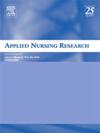复原力在高死亡率服务中护士共情与职业悲伤之间的中介作用
IF 2.2
4区 医学
Q1 NURSING
引用次数: 0
摘要
在高死亡率的临床服务部门工作的护士,如重症监护室、肿瘤科和姑息治疗病房,经常目睹病人死亡。这种反复接触使他们面临丧失亲人反应的高风险;然而,有限的研究探索了个人的情感特征,特别是同理心和适应力,是如何塑造这种经历的。目的本研究旨在探讨心理韧性在护士共情与丧亲反应(短期情绪反应和长期累积效应)之间的中介作用。方法采用横断面设计。数据在线收集了238名在土耳其西北部一家三级公立医院工作的护士。标准化的工具被用来测量同理心、恢复力和职业丧亲之痛。结果护士报告患者死亡后出现中等程度的丧亲反应。共情与短期丧亲反应(β = 0.253, p = 0.001)和长期累积效应(β = 0.359, p < 0.001)呈正相关。复原力部分介导了这些关联,降低了共情对短期丧亲反应(β = 0.071, 95% CI[0.017, 0.133])和长期累积效应(β = 0.137, 95% CI[0.084, 0.193])的影响。结论高死亡率服务机构的护士特别容易经历丧亲之痛。虽然更高的同理心会加剧丧亲反应,但恢复力起着保护作用。旨在增强复原力的干预措施可能有助于减轻丧亲之痛的负面影响,促进情绪健康、工作可持续性,并改善这些情绪要求高的环境中的患者护理结果。本文章由计算机程序翻译,如有差异,请以英文原文为准。
Resilience as a mediator between empathy and professional grief among nurses in high-mortality services
Background
Nurses working in high-mortality clinical services, such as intensive care, oncology, and palliative care units, frequently witness patient deaths. This repeated exposure places them at a high risk of bereavement reactions; however, limited research has explored how individual emotional traits, particularly empathy and resilience, shape this experience.
Aims
This study aimed to investigate the mediating role of resilience in the relationship between empathy and bereavement reactions—both short-term emotional reactions and long-term cumulative effects—among nurses working in high-mortality services.
Methods
A cross-sectional design was used. Data were collected online from 238 purposively sampled nurses working in a tertiary public hospital in northwestern Turkey. Standardized tools were used to measure empathy, resilience, and professional bereavement.
Results
Nurses reported moderate levels of bereavement reactions following patient deaths. Empathy was positively associated with both short-term bereavement reactions (β = 0.253, p = 0.001) and long-term cumulative effects (β = 0.359, p < 0.001). Resilience partially mediated these associations, reducing the impact of empathy on both short-term bereavement reactions (β = 0.071, 95 % CI [0.017, 0.133]) and long-term cumulative effects (β = 0.137, 95 % CI [0.084, 0.193]).
Conclusion
Nurses in high-mortality services are particularly vulnerable to experiencing bereavement. While higher empathy intensifies bereavement reactions, resilience plays a protective role. Interventions aimed at strengthening resilience may help mitigate the negative effects of bereavement and promote emotional well-being, job sustainability, and improved patient care outcomes in these emotionally demanding settings.
求助全文
通过发布文献求助,成功后即可免费获取论文全文。
去求助
来源期刊

Applied Nursing Research
医学-护理
CiteScore
4.50
自引率
0.00%
发文量
65
审稿时长
70 days
期刊介绍:
Applied Nursing Research presents original, peer-reviewed research findings clearly and directly for clinical applications in all nursing specialties. Regular features include "Ask the Experts," research briefs, clinical methods, book reviews, news and announcements, and an editorial section. Applied Nursing Research covers such areas as pain management, patient education, discharge planning, nursing diagnosis, job stress in nursing, nursing influence on length of hospital stay, and nurse/physician collaboration.
 求助内容:
求助内容: 应助结果提醒方式:
应助结果提醒方式:


